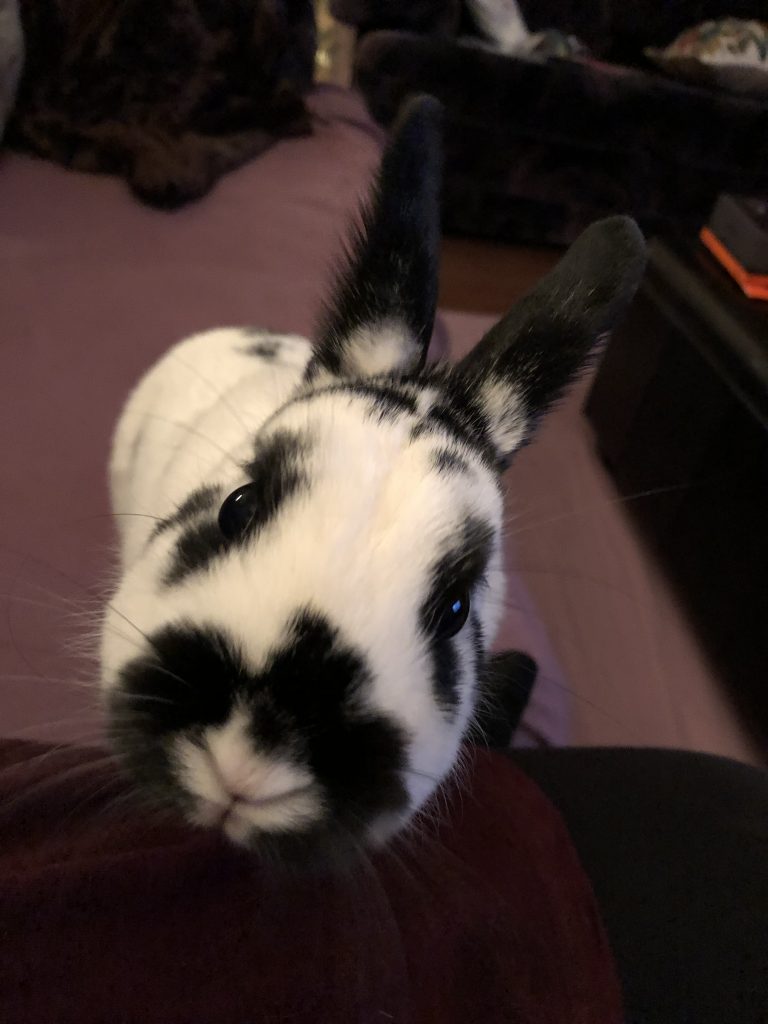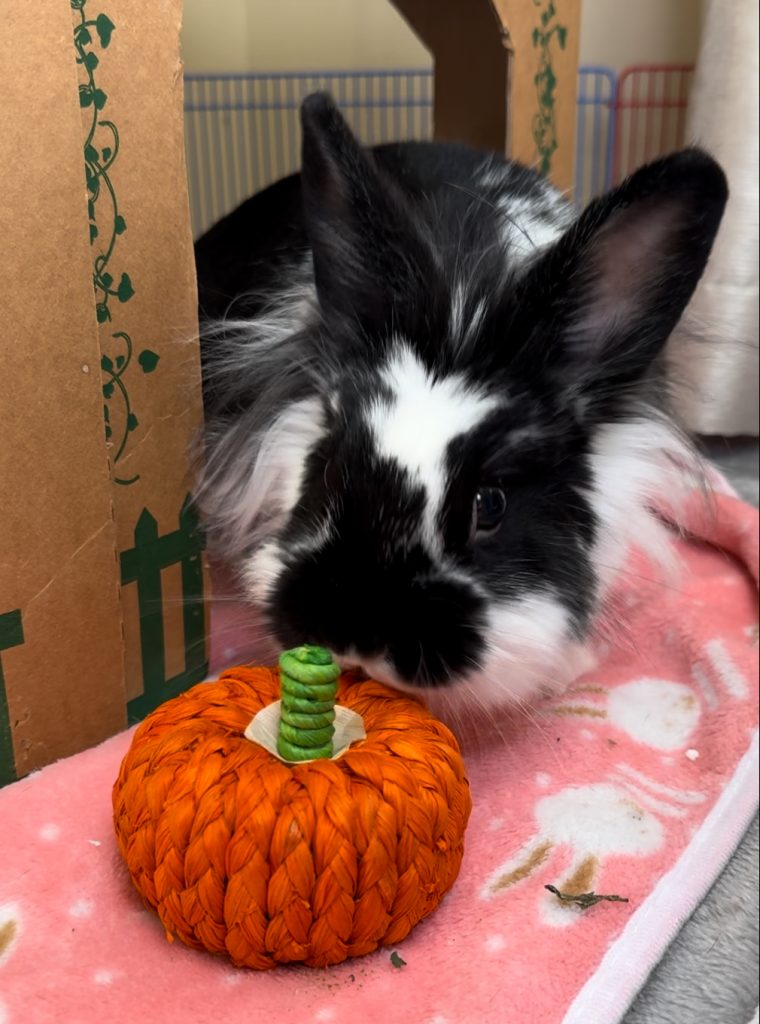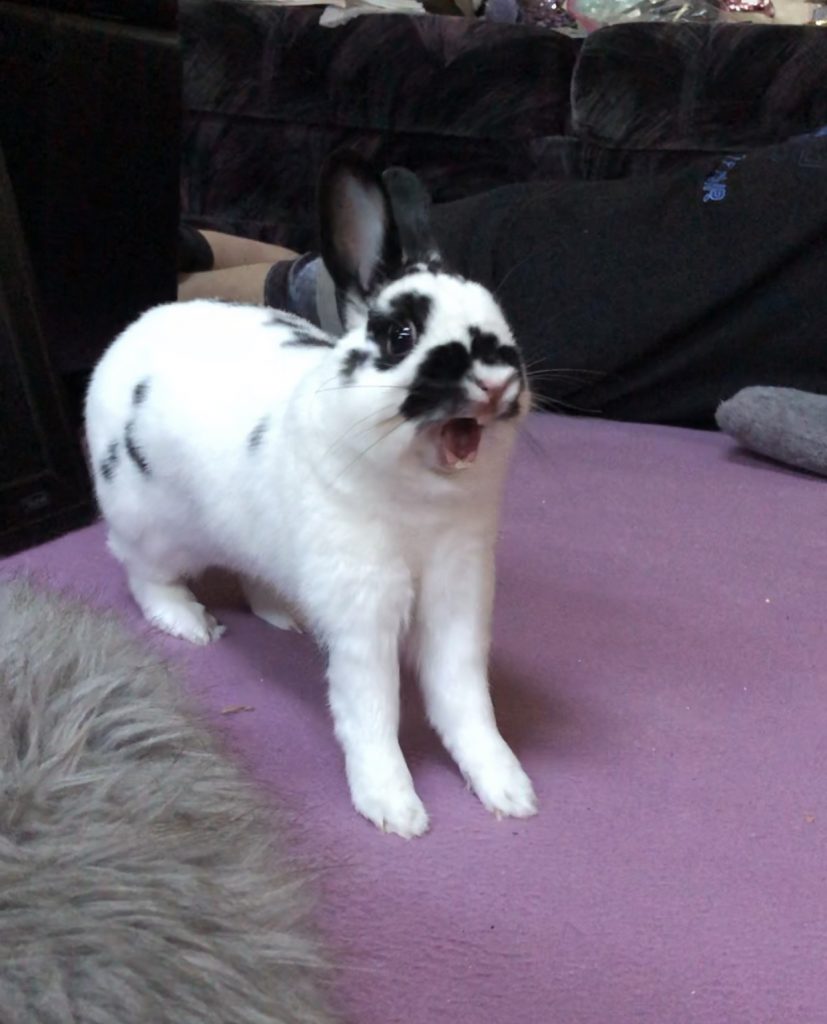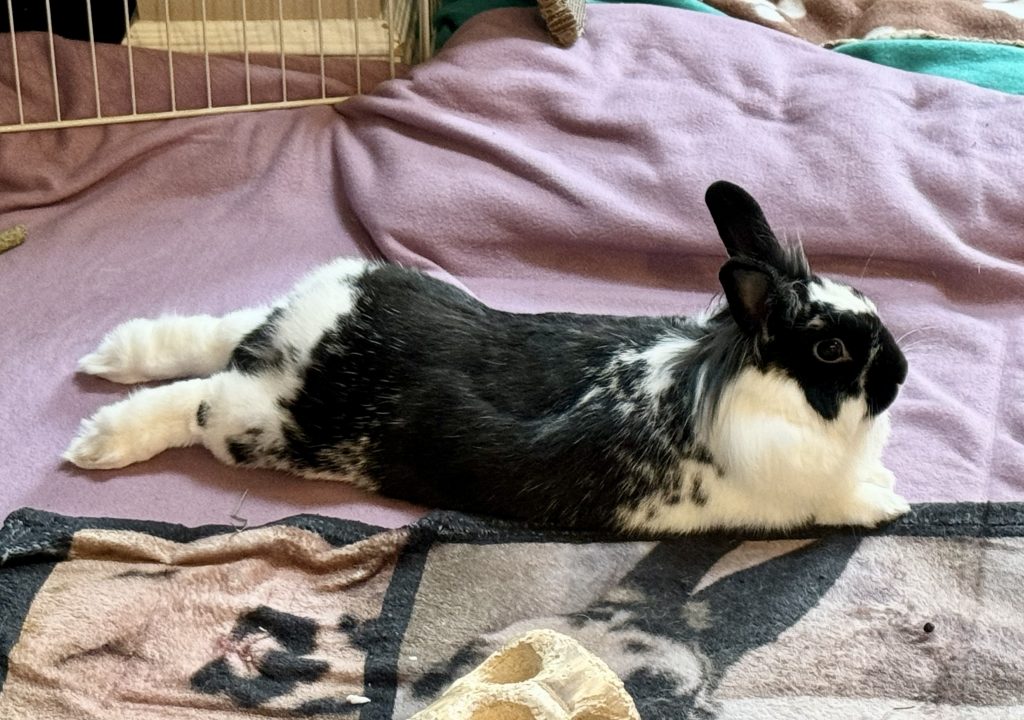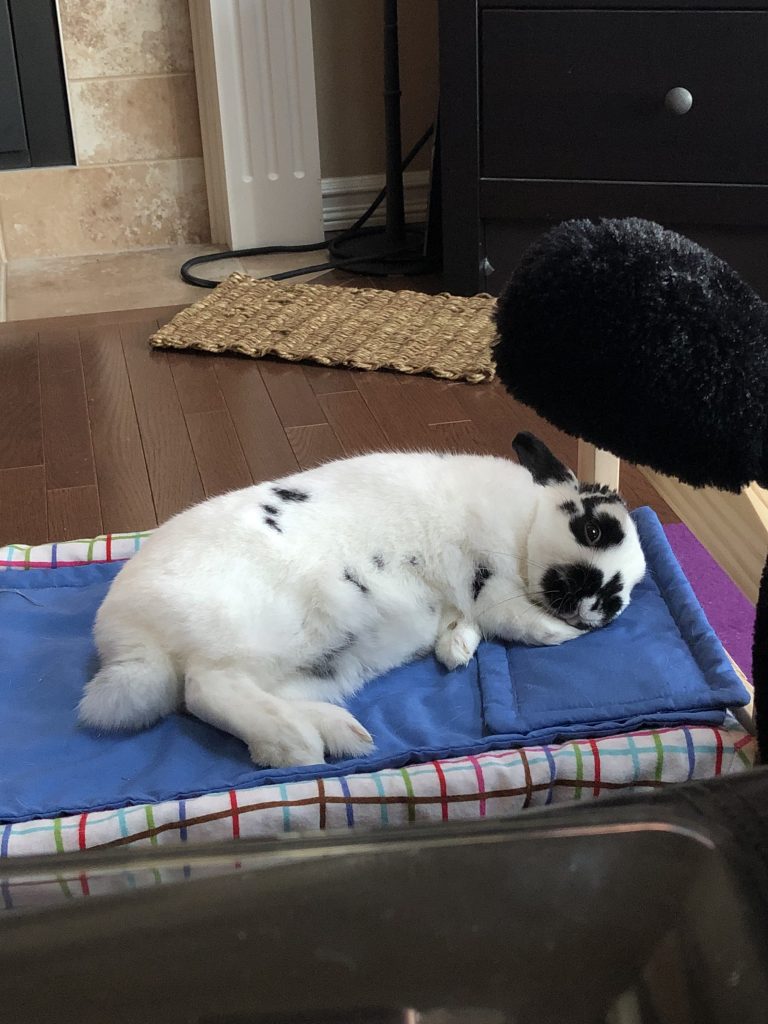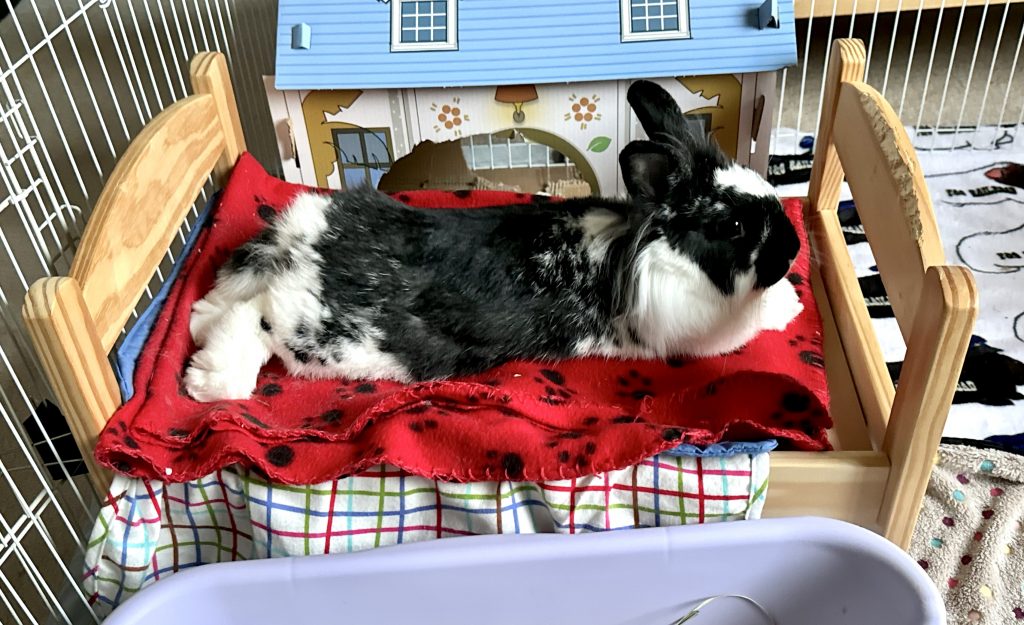Two months since Dad’s celebration of life, and still one flower from the service’s floral arrangement clings to life. 🩵💜🩵 So too does the pain, the trauma flashbacks, and the beautiful memories.
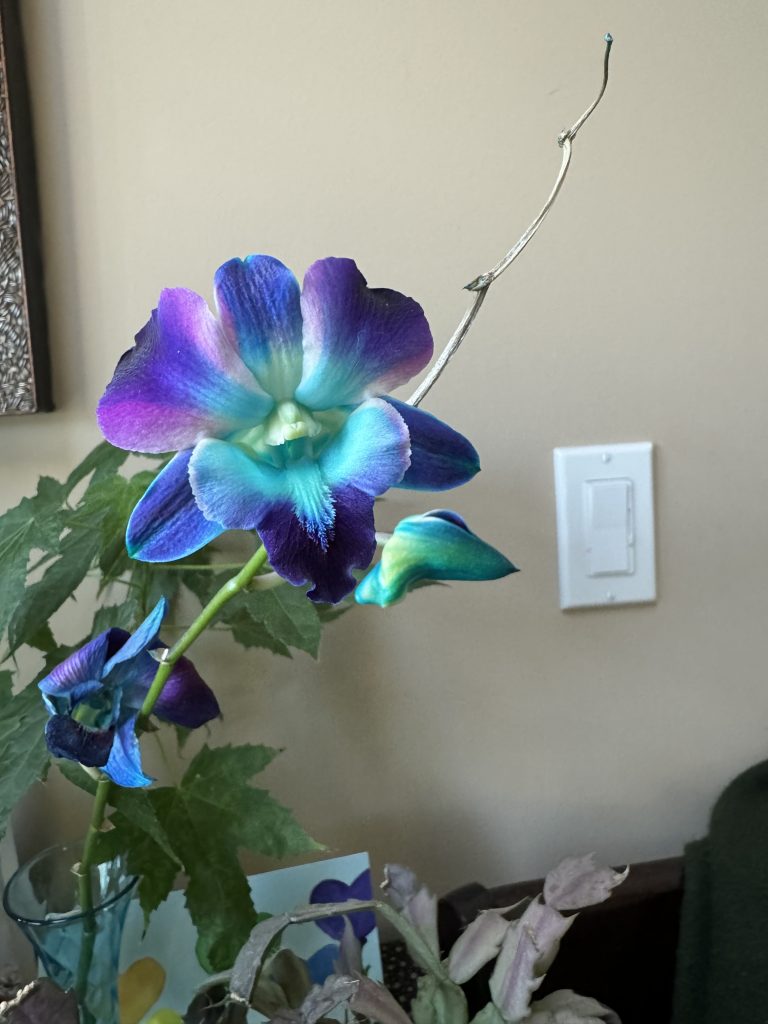
Original arrangement, August 22, 2024:
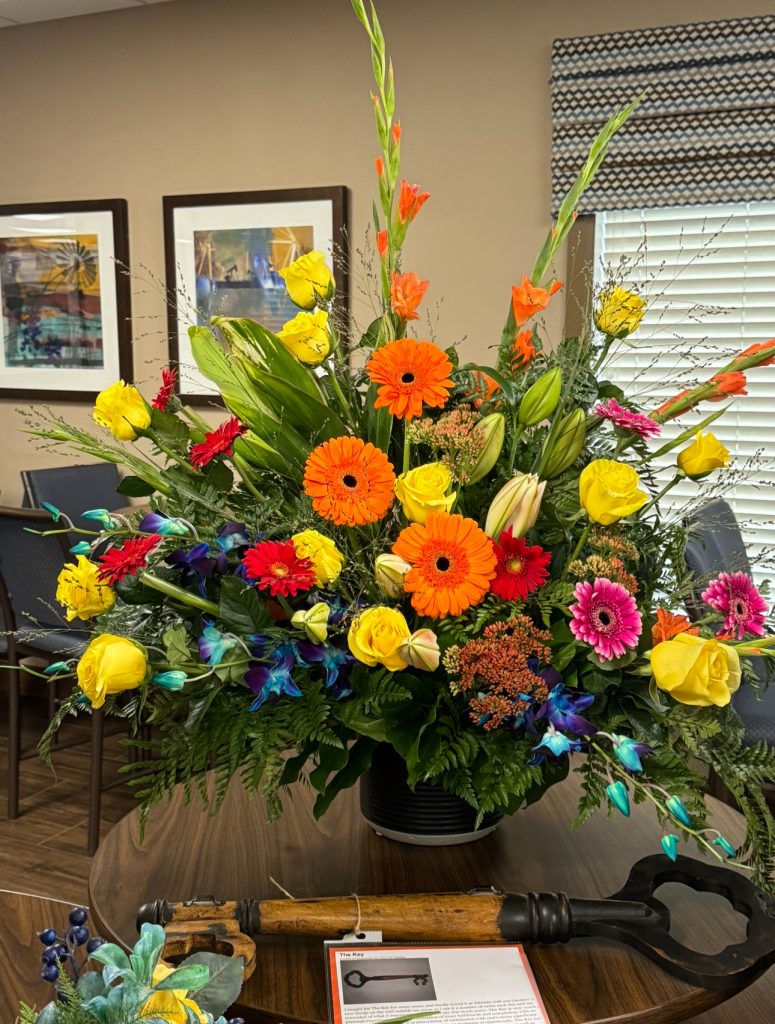
Two months since Dad’s celebration of life, and still one flower from the service’s floral arrangement clings to life. 🩵💜🩵 So too does the pain, the trauma flashbacks, and the beautiful memories.

Original arrangement, August 22, 2024:

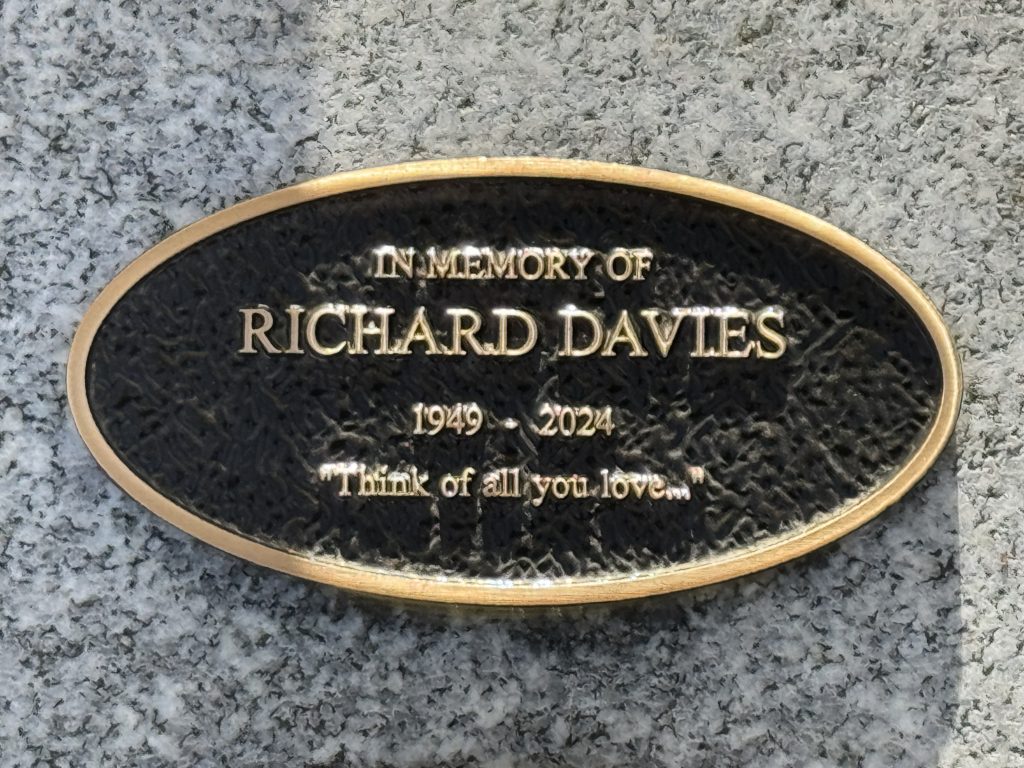
We visited the cemetary today. The plaque and granite pillar was installed by the City, along with the beautiful, deeply engaging epitaph Dad had requested. We lovingly placed a few flowers, including a rose each, at Dad’s, Grandpa Reade’s, and Grandma Reade’s graves, and took time to remember – remembering and honouring their beautiful, giving lives, the beautiful hearts gave us so many reasons for thanks on so many past Thanksgivings. We remembered all the beautiful dinners we shared together, the deep conversations, the lighthearted laughter.
Last visit to South Haven we were almost wiped off this planet by a speeding car going through a dead red as we turned on a green turning arrow. Less than 2 seconds separated us from life and death, from travelling to the undiscovered country. Yet still I type, for another day. It was a sobering reminder of how tenuous and gossamer this life we lead truly is.
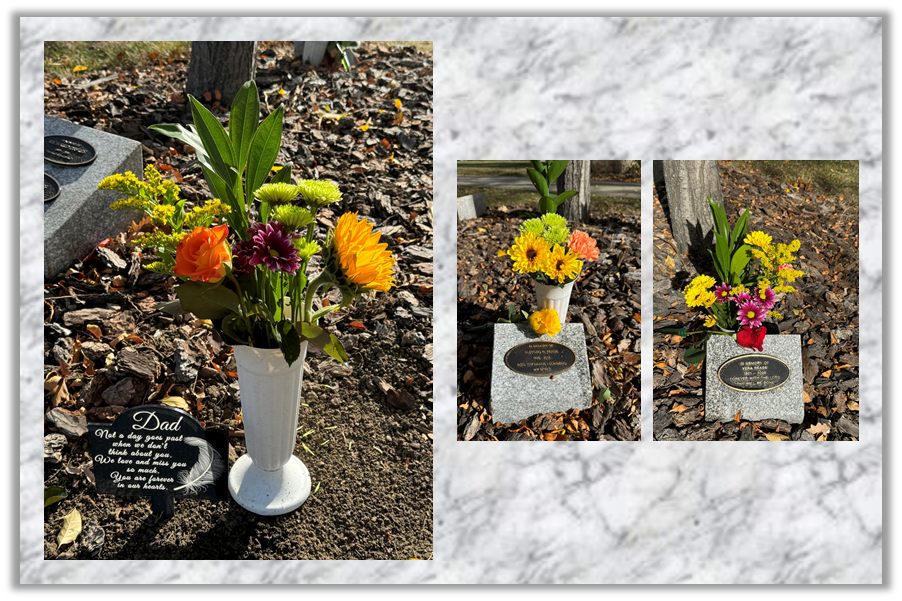
The sun is low in October, despite visiting at solar noon. We aren’t sure if we will be able to make the drive out during winter. Cold temperatures and snowy, icy roads tend to keep us close to home.
We made the best of the visit. The shadows cast long across the ground, and indeed, my heart.
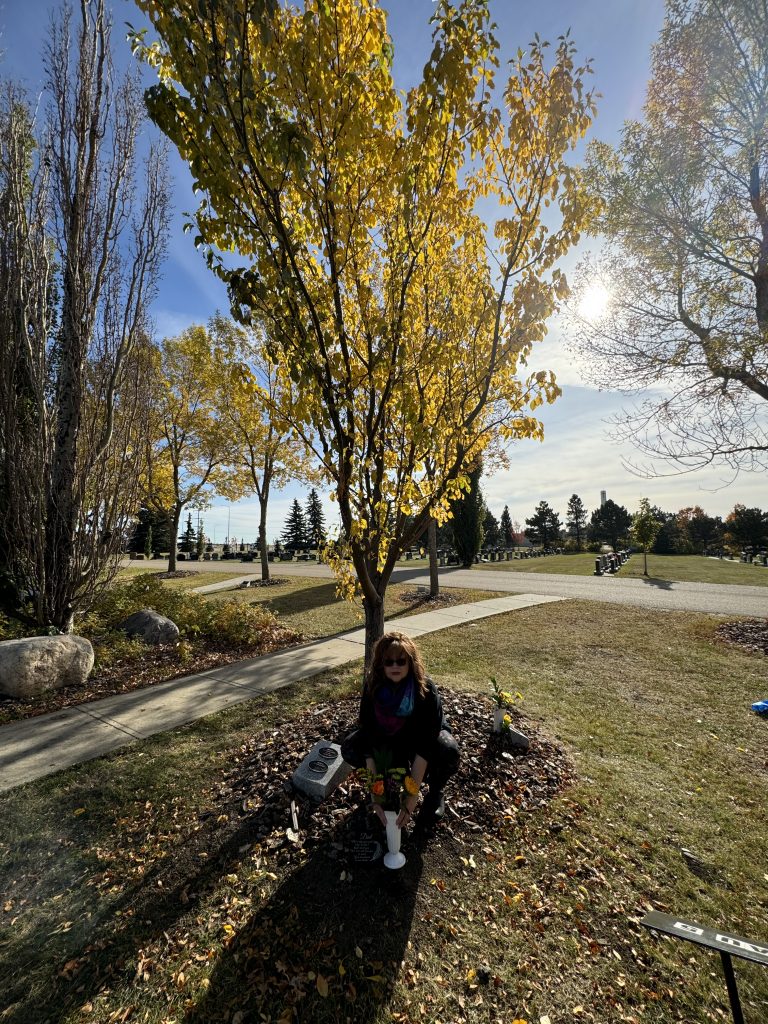
Mom has been punished for having her husband pass away- her house insurance just went up from $247/month to $650/month.
We are still going to provide a few details about security, new roofing and furnace, and will be providing confirmation that there is no longer any outstanding mortgage.
We were advised that Dad had some kind of apparently super secret stealth discount (of course neither woman we spoke to have any information about this, they’re in some “other department”. He has provided consent long ago (possibly blood sample, too) and his score came back an “A”.
Mom has now officially provided her “consent”. They will take her name away to this other department (?in the back room of a casino?) where they will plug her name in and see what her “score” comes out to (I’m thinking roulette wheel spinning, or perhaps tossing her name down a flight of stairs and seeing which step it lands on), and what kind of discount this score warrants.
Obviously, an increase of $400 a month is unsustainable.
We await the news of this “discount”. The lady we spoke to will first “get word” (possibly carrier pigeon) from this Very Separate Department and then she will call us back.
To be continued…
For five decades, Dad has been a driving force in my life. I wanted to do him proud and bring him joy. So much of what I did and how I flourished was due his nurturing, his encouragement, and his loving enthusiasm. He caught me when I stumbled, rallied and cheering me on.
The turning wheel of the seasons and celebrations throughout the year provided anchors to come together, have fun, participate in rituals and jokes, and enjoy great food. One of the nights in ICU I walked Dad through the holidays with the greatest of love, talking about our special times, our jokes, our beautiful rituals, how he brought so much to everything, and how much I was looking forward to more good times ahead with him.
—-
Nights were the worst in ICU and the time when vitals would drop and alarms would clang and ring. I’d hear the panicked alarms of other patients struggling to breathe, hearts failing, IVs running out, so much struggling to live. I’d go home and my ears would be ringing, extreme tinnitus activated. When I would stand (unable to sit given set up) and talk next to him, holding his hand, Dad’s breathing would slow and the ventilator alarms would be less frequent. I talked for hours on end until hoarse… Until I had to run through the darkened hallways and collapse in the bathroom in a choking, coughing fit, also gasping to breathe.
—-
I don’t plan on celebrating anything this year for the first time in my life. Any attempt would feel like a cheap, empty imitation. Whatever happens after this year, it won’t look anything like my first five decades with Dad. I’m under no illusions.
It’s hard to imagine a path forward out of just surviving. Standing among the ashes I sometimes wonder what the rest of my life will be like. I recognize there is opportunity, hence the title of this site. But still I wonder if/how I will find meaning, and what will drive me on.
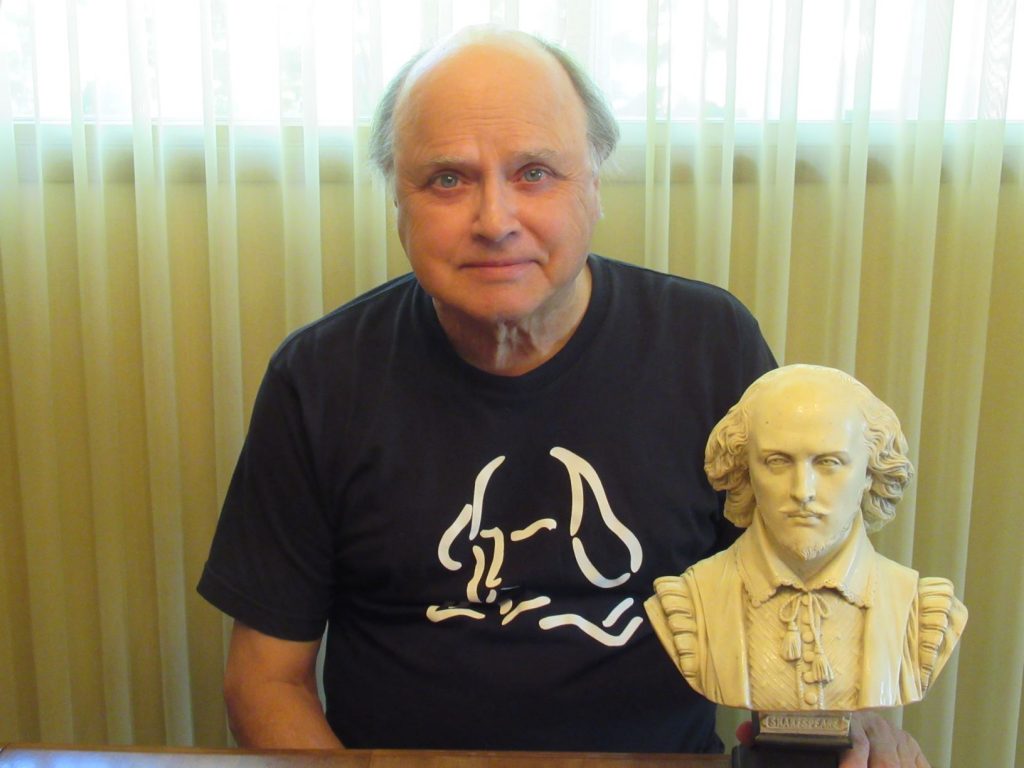
Recordings from the service are available here at the following address (please note the user name and password below):
https://thirring.org/celebration
User name is: private
Password is: private
Recordings available for viewing:
We recommend for the slideshow part of the service that you watch the slideshow.mp4 video as view and resolution is much better!
A link to the beautiful, original piece “Blue Skies” played at the service by Dad’s friend Ken Klaus is here to enjoy again on TikTok: https://www.tiktok.com/@1kklause/video/7339742865058237702?_t=8qKH7x7py5d&_r=1
For anyone wishing to visit the incredible legacy blog Dad wrote for 12 years, please visit: tothineownselfbetrue.ca
A search on the right of the page enables you to search for key words if particular topics are of interest to you! The blog covers a lot of ground.
My book budget has been pretty lean this year, but a book I ordered after Dad’s Celebration of Life arrived today. It features the work of artist John Martin, whose art has featured previously on this blog. Martin’s apocalyptic landscape pieces have spoken to my mood as of late, as I wander the ashy wasteland of my own devastated life. I recently read that Martin had his own share of personal tragedy – in fact, he lost his father, mother, grandmother and young son in a single year. His painting of apocalyptic scenes of death and destruction continued after a period of mourning.
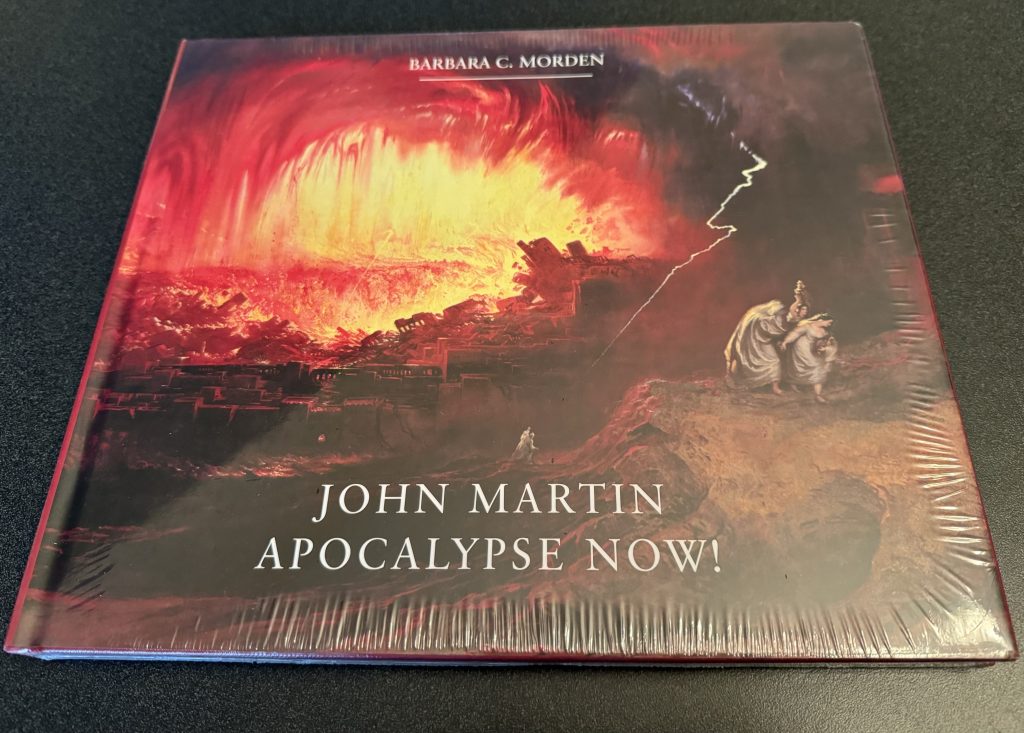
I had to chuckle as I unpacked the book from the package and the title really sunk in for the first time. Immediately I was taken back to Grade 11 at Strathcona Composite High School. I was fortunate to attend classes there, enjoying Dad’s company to and from school, as he worked there as an English teacher. He had orchestrated my taking an academic challenge English course that year. It was there we delved into motifs of dark and evil, goodness and light, and tracked the Renaissance-Enlightenment-Romantic periods through literature.
My world blew up when encountering some of the many romantic poets who spoke to my soul. Shelley, Wordsworth, Keats… I remember reading reading the romantic poem in front of the class – Percy Bysshe Shelley’s “To a Skylark” – while transcendent Mozart music played on a tape recorder behind. “Hail to thee, blithe spirit”… Pure bliss. My heart found its home, and I longed to reside in the passionate Romantic era forever.
The class took a deliciously dark turn, and we began exploring themes focused on the loss of innocence and evil, which spoke to my teenaged angsty desires. At one particularly dark moment, our teacher led the class to the shadows of the basement boiler room to read TS Eliot’s The Hollow Men and The Wasteland.
I was introduced to the movie A Room With A View. An early scene tracks a prim and proper, innocent and sheltered Lucy Honeychurch observing a suddenly violent and gory scene – a man’s stabbing and the frantic aftermath as villagers attempt unsuccessfully (and rather bloody) to revive his corpse in a fountain. Although not entirely sure why, I excused myself from the classroom and began walking to the washroom along the green-tiled corridor. Darkness on the periphery of my vision began spreading inward, until dark spots began appearing in the center of my view. I’d never passed out before, but that day I nearly lost consciousness. An instinctual reaction of horror. Previously sheltered from gore and violence, my personal experience witnessing that opening scene was every bit my loss of innocence as it was Lucy’s.
Midway through the term I found myself unexpectedly led into the deepest, darkest, most labyrinthine jungles of Africa with Charles Marlow in the novella Heart of Darkness by Joseph Conrad. Kurtz’s summative quote “the horror! the horror!” has haunted me through my years, continuing to resonate to this day (and on retrospect, it sums up July 2024 nicely, actually). Studying Heart of Darkness was a natural segue to Francis Ford Coppola’s Apocalypse Now, a movie loosely tracking the same plot. My delicate sensitivities were not able to watch the movie in its entirety, but I did remain in the classroom for its duration, turning away during the more difficult visual parts. (As an adult I remain acutely distressed at gory visuals, and have to choose my viewings carefully.)
After the classroom viewing, Dad introduced me to Eleanor Coppola’s: “Hearts of Darkness: A Filmmaker’s Apocalpyse”, a documentary chronicling the production problems and bad luck cloud that seemed to hover over filming Apocalypse Now. We enjoyed the dark humour of Ford’s filming experience, and would later joke about Francis Ford Coppola, and my dark angsty grade 11 year. The humour levelled up when when the Francis Ford Coppola winery brand was established in 2010. Dad would often delight in seeking out the Coppola wine, and it graced many a dinner table during family get togethers. A private, shared, dark humour. I still have the last Coppola wine he gifted me back around May – long since emptied, naturally – and deeply cherished.
Grade 11 was a pivotal, transitional year in many ways. Beautiful worlds of possibilities opened up as as I encountered the romantic poets (John Keats: O! for a life of sensations than of thoughts!) and composers, Shakespeare’s Macbeth, and artistic films such as Room With A View and Psycho (yes.) in the class Dad had facilitated.
And outside of class – in between blissful lunchhours escapes to Hawrelak and Emily Murphy parks – we had so many other treasured shared experiences. Dad and I would listen to Paul Simon’s Rhythm of the Saints, Johnny Clegg’s Cruel, Crazy, Beautiful World and Sting’s Soul Cages album as we rode to and from Strathcona in his little blue Toyota Corolla. We watched – no, experienced – Dad Field of Dreams, Dead Poets Society, and Kenneth Branagh’s Henry V in the theatre together. Dad introduced me to The Power of Myth, an exploration of mythology with Joseph Campbell hosted by Bill Moyers. “Follow your bliss” became my life mantra. There were so many transformative artistic works forever etched in my romantic yearning soul.
Grade 11 was also the year I encountered my first John Martin painting, titled “The Bard” (below) – considerably less apocalyptic than the paintings in the book that arrived on my doorstep today, but still fraught with great tension. At the time I instinctively loved it and intuitively identified with it. Looking back now, I think the painting spoke to the awakening and transformation of my own romantic soul that year, largely due to Dad’s myriad of influences. It was a year I began to take my own path separate from conventional society, as I began to understand my own individual identity and realize self autonomy and the deeper passions that lay within my heart.
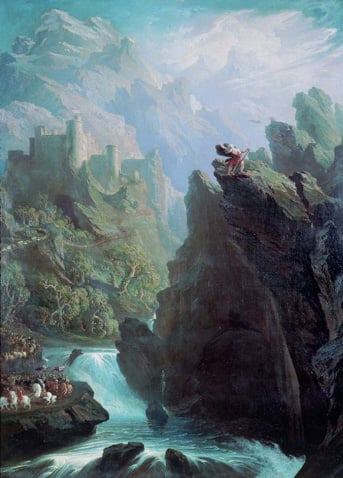
Every year we gathered on Remembrance Day, enjoyed your beautiful, thoughtful display of the Grandparents and war remembrances on the fireplace (below), and solemnly watched the ceremony on TV. In May I planted some special Flanders Fields poppies in the front yard, looking forward to thrilling and delighting Dad with something new and special.
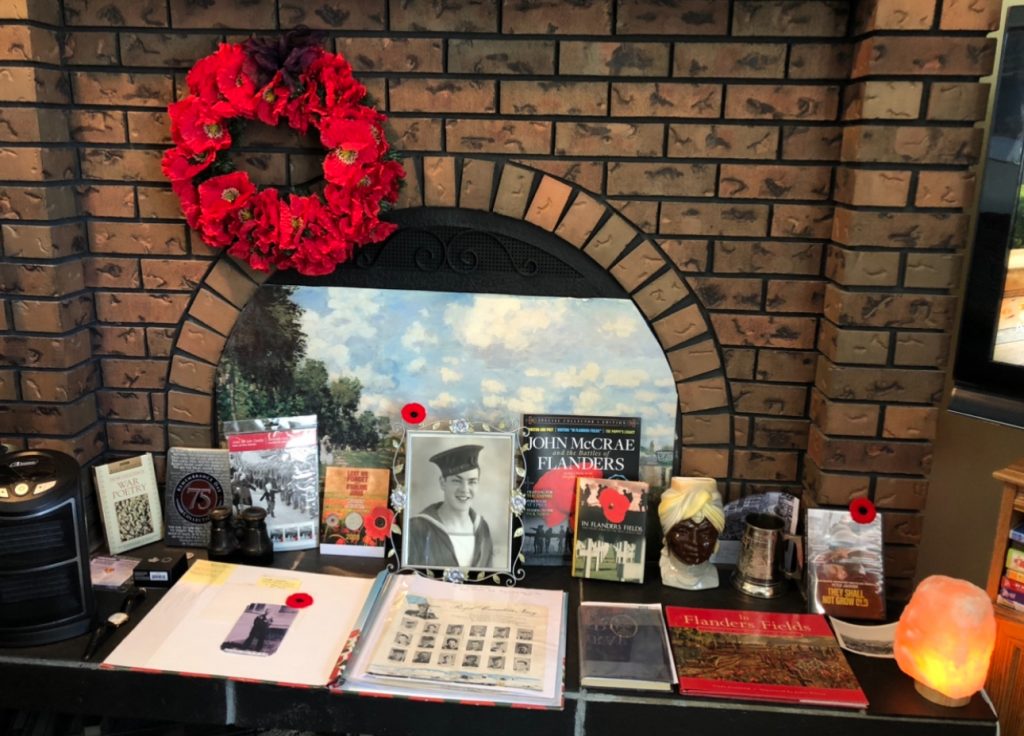
Today has been a particularly gut wrenching day for some reason. A bad sleep, tortured dreams (including a miraculous recovery by you, Dad, oh, if only), grey skies, and I’ve gone through the day with that lump in the throat ever present.
I hope in some way Dad you can somehow enjoy the flowers I planted for you with all my love- the ones that bloom so brightly today, under the grey skies. I miss you so much. Now they bloom in remembrance of you.
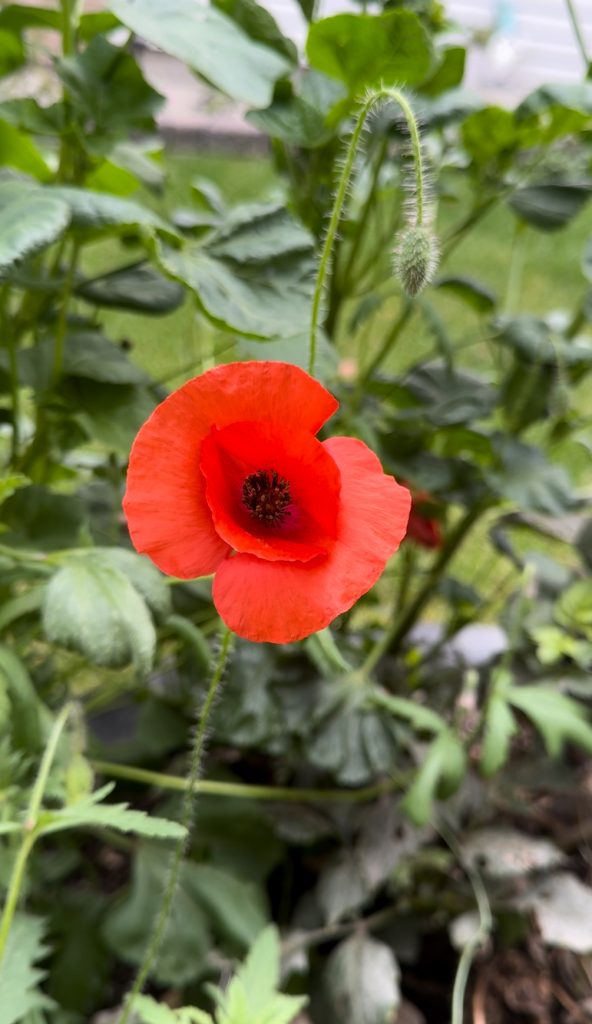
The night of the first frost is my least favourite day of the year as a gardener. I have a limited number of old bedsheets that are put to good use, but I’m only able to cover a tiny fraction. The worst is wandering around with sheets and deciding who shall live and who shall die tonight. It is terrible to have such responsibility. The uncovered, heading to the gallows, beg me to live. The covered are whispering, “dead plant walking” to the ones left behind. The temperature is at 5C now and dropping. Some are plants my father bought me in May. And I must let go.
A few flower pictures taken today. I will be posting further on gardening soon.
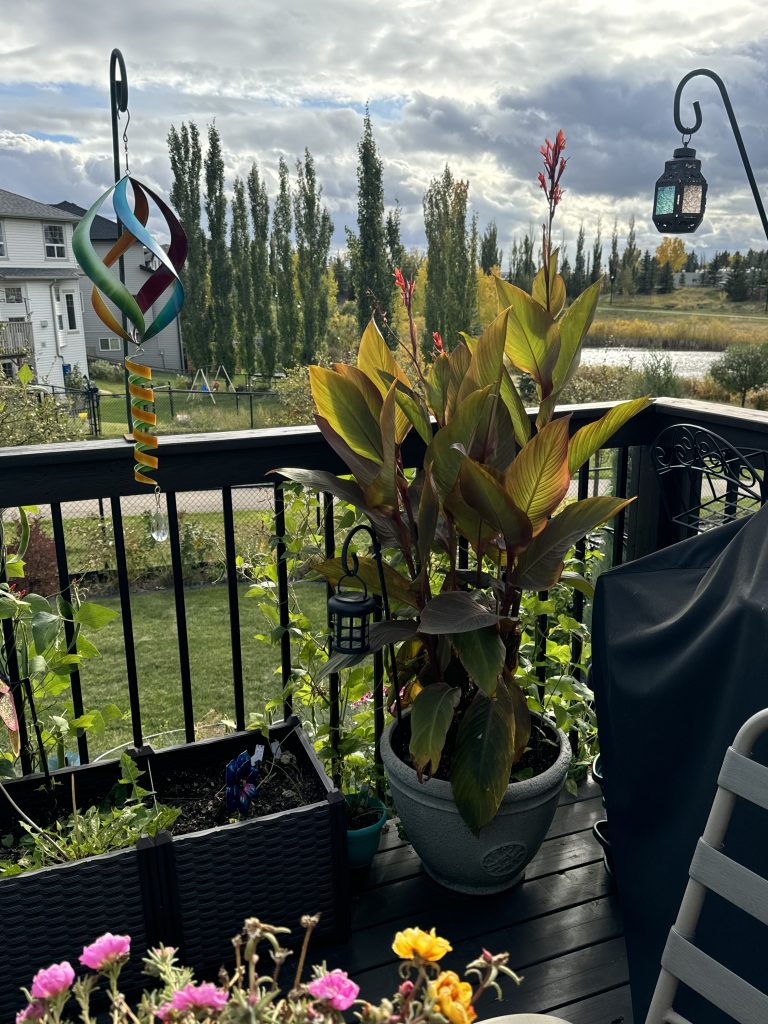
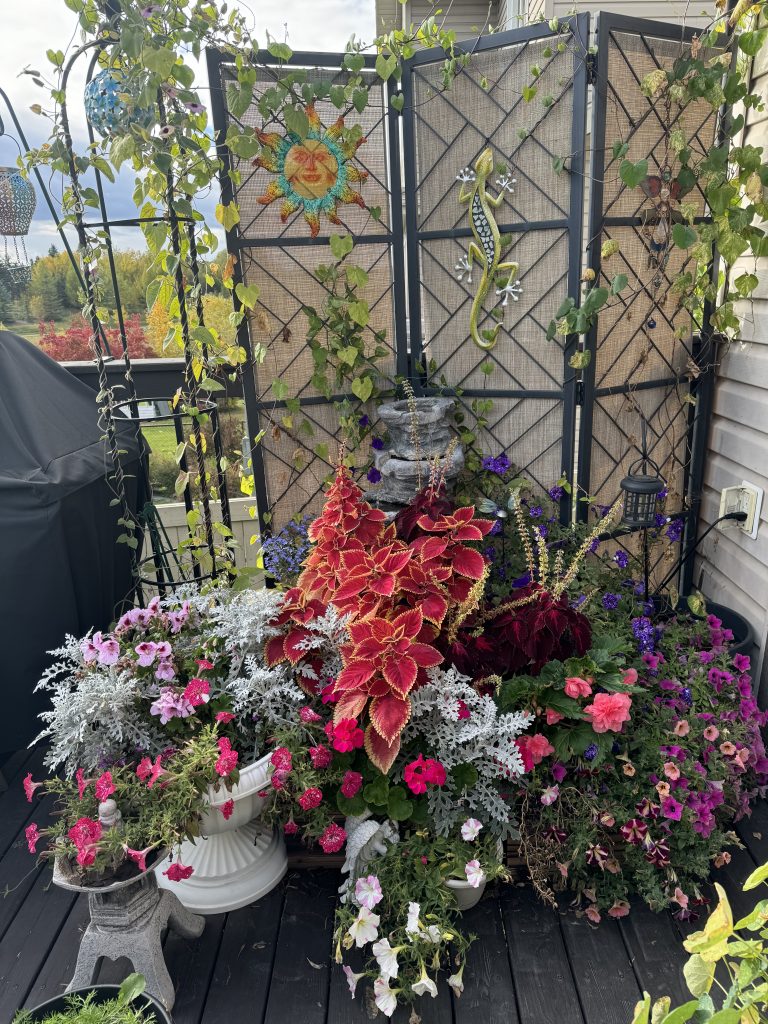
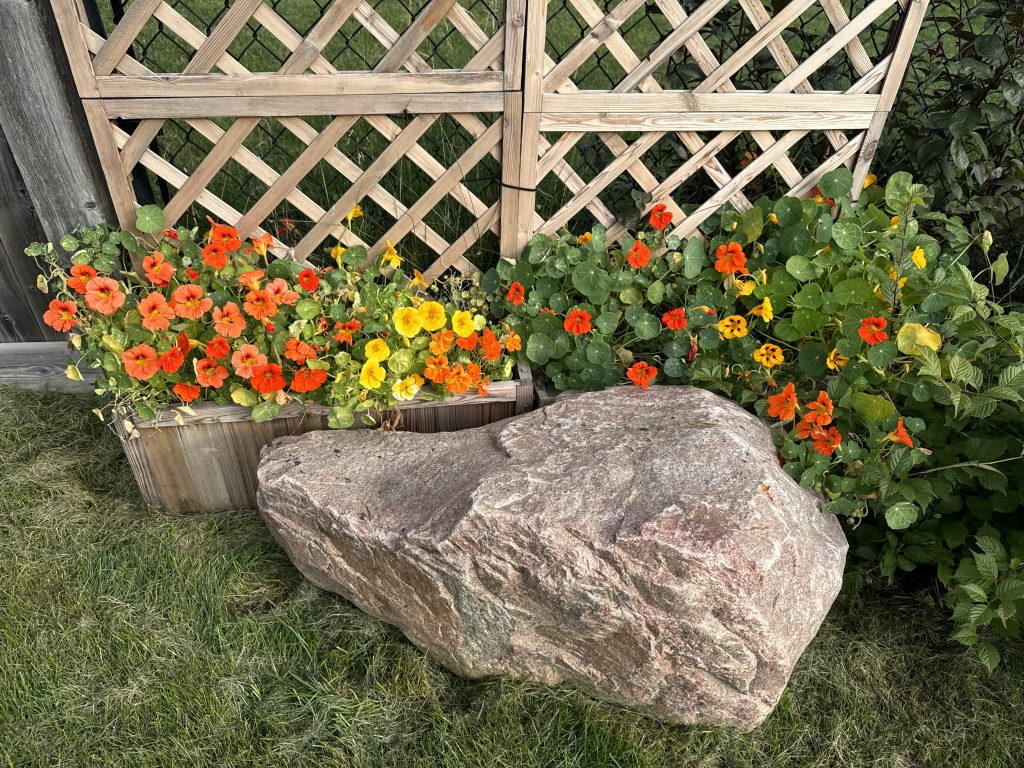
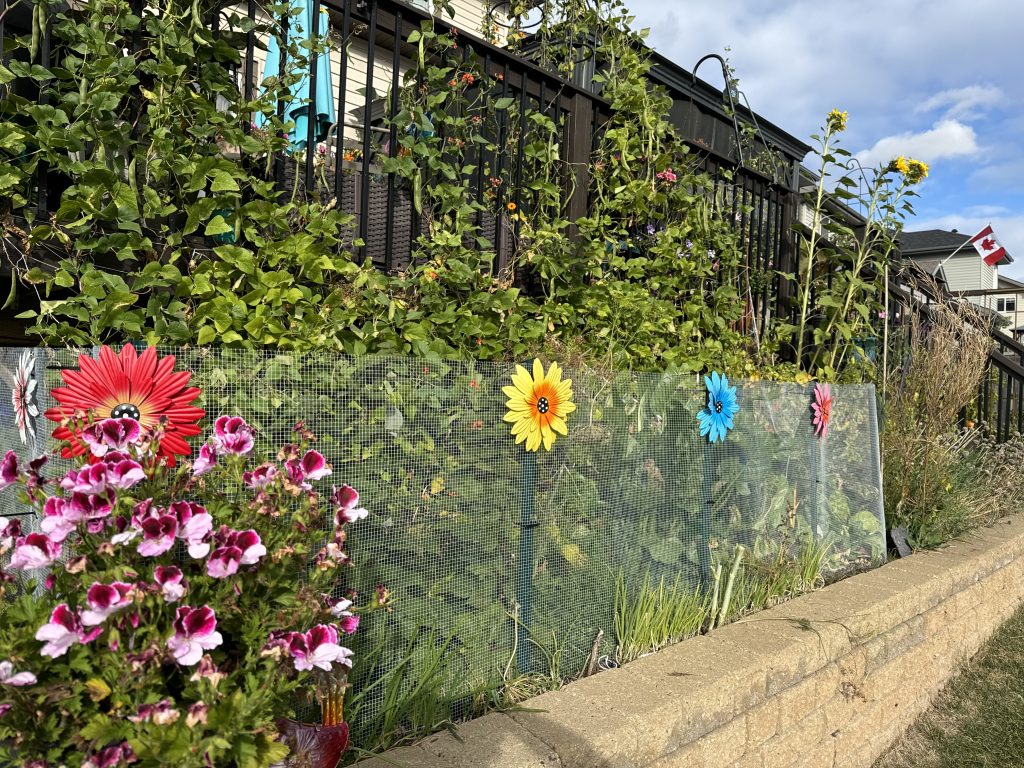
Spoiler alert: Most in these photos will die.
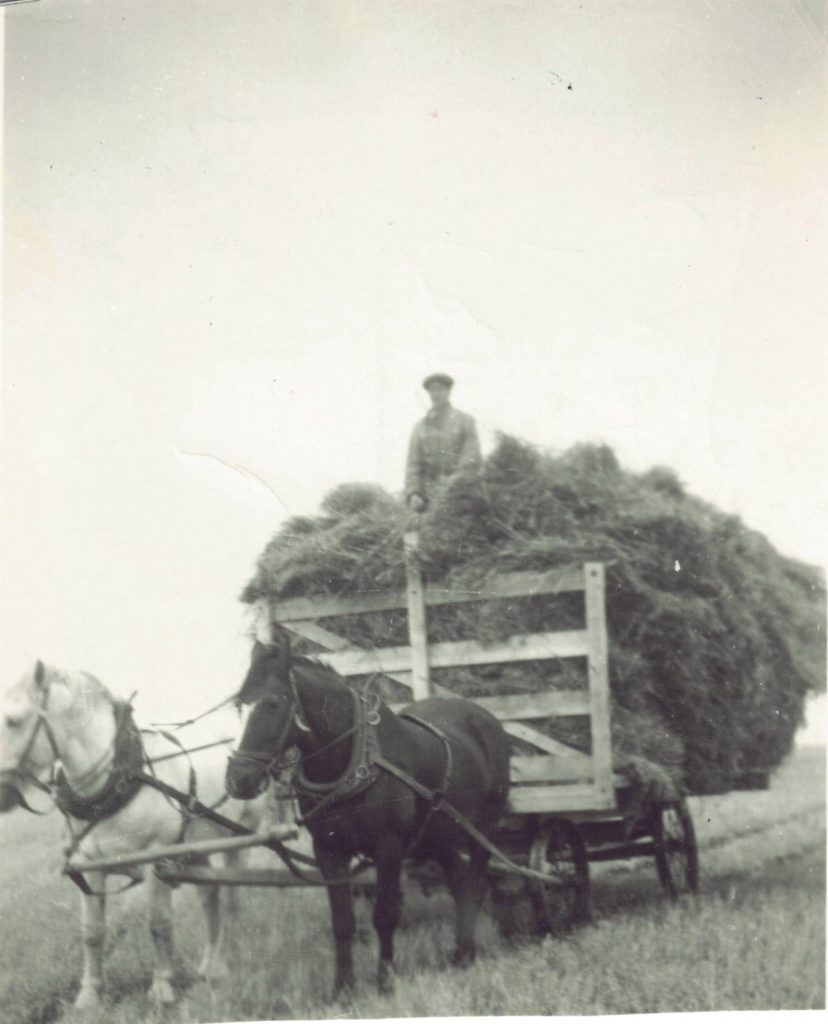
Grandpa (Vernon Delmar) Davies (Pictured):
“Thrashing in Lenore/Virden Manitoba 1947.
I loaded it all myself.”
My Grandma (Rosalie nee Malowny) Davies, would frequently say in passing through the decades, “it’s a good life if you don’t weaken”. It’s a variation on a quote particularly popular around 1908-1920s, and Grandma said it so often I honestly thought for many years she was the originator. It is apparently more often to hear “great” in place of good, but Grandma never dared to be that optimistic. Whenever Grandma would say it to our family, her jaw would tighten, and you could feel the, resolute, steel-tough, laser-focused steel toughness behind the words. She was laser focused on enduring and continuing onward.
My Grandma had a tough life.
I only realized, years later, how tough. She grew up poor, in a massive family, on a homestead in in Libau, Manitoba, where the girls and women worked to the bone, and often went hungry to feed the men. She didn’t speak much of that time. In fact, I only remember one story: during corn harvest, they were blessed to have food, and she had over 20 cobs in one sitting. Absolutely starving, and one moment in time they had an abundance of food for everyone.
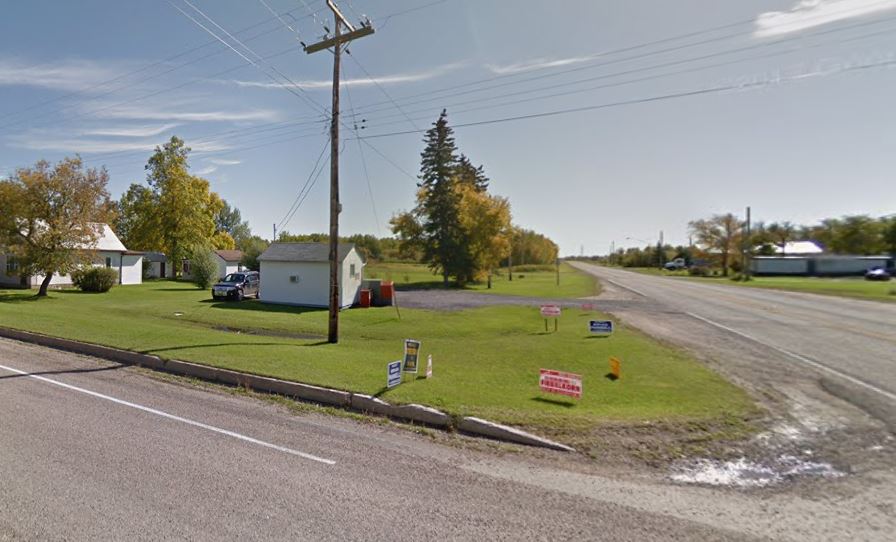
The booming town of Libau, Manitoba, seen today.
Post office is tiny white building centre-left.
My Grandpa Davies, similarly, grew up in Selkirk, Manitoba, on the homestead. His father taught him how to swim by throwing him off a bridge into the Red River. I am not kidding, this is literally what my Great Grandfather did to a young Literally not kidding, it was a story he told his entire life, with chills. If he hadn’t been able to stay afloat that day, well, I wouldn’t be writing this blog today. A whole family tree, gone.
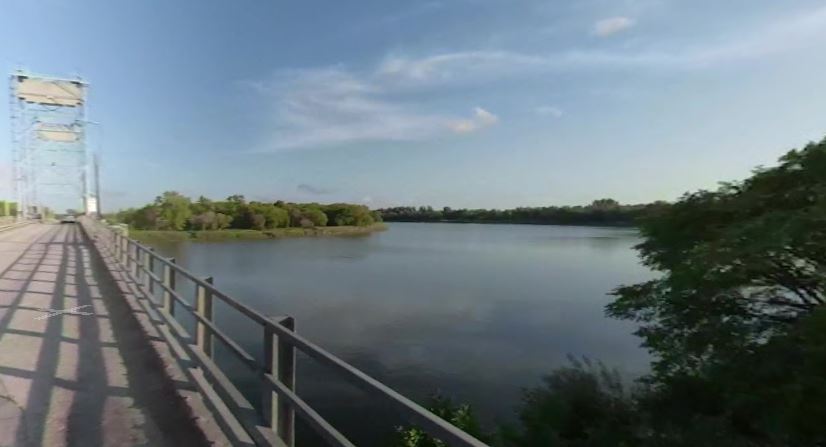
Selkirk Bridge today spanning the Red River
My Grandpa (Clifford William) Reade, similarly, had a tough upbringing in a huge family, emerging from his childhood with a toughness and a burning to make more of his life once out of the family home. His father was headmaster and teacher of the one room schoolhouse in Moose Jaw, Saskatchewan. As was the case with all my grandparents growing up (except for my Grandma Reade), I’m pretty certain corporal punishment was a regular occurrence.
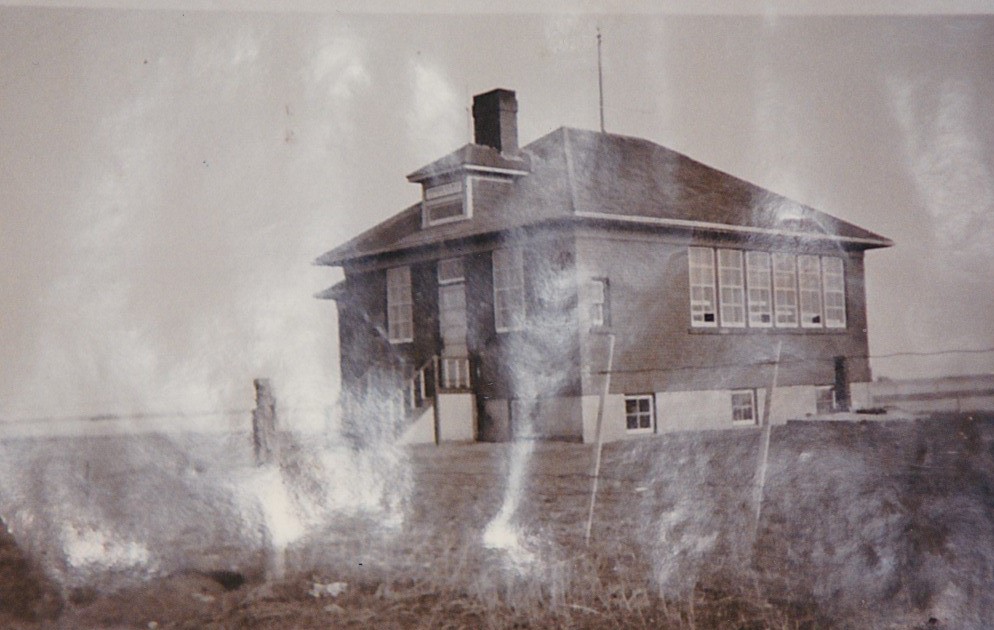
The school house my Grandpa attended under his father’s iron rule.
My Grandma (Vera) Reade grew up in a Duokhobor settlement, one of six children, in Blaine Lake, Saskatchewan. My Great Grandparents had left a much more climate-friendly watermelon-growing British Columbia Duokhobor settlement (due to circumstances I’ll share in a later post), to the harsh, unforgiving prairie with its bitterly cold winters. Grandma would recall feeding the men first, my Grandfather and his employees on the farm, and how the women would hungrily wait, eating afterwards if there was any food that remained.
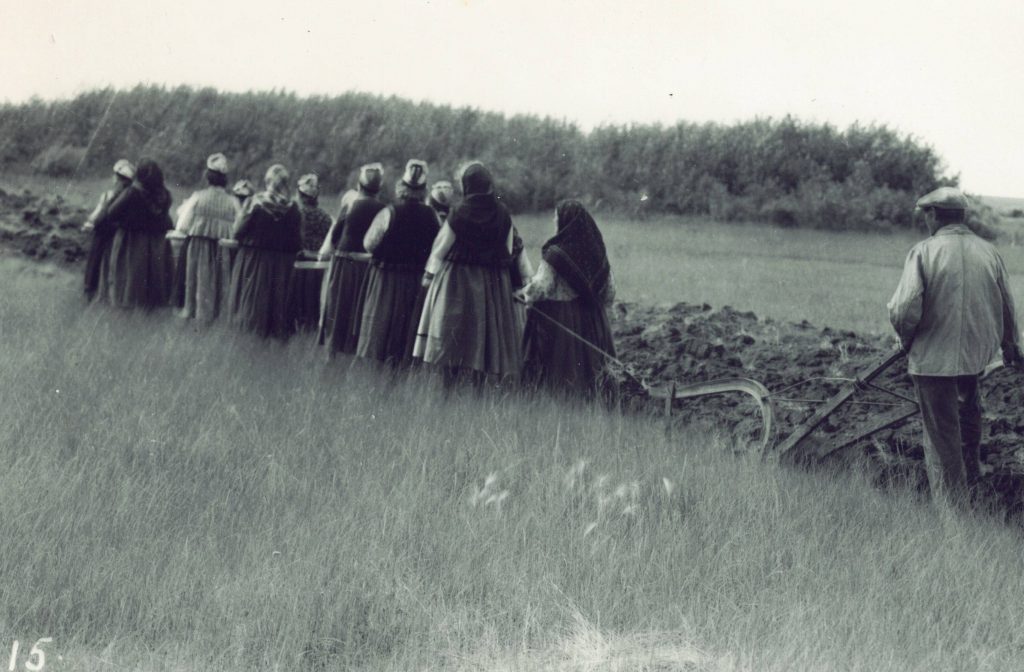
A team of women in traditional Duokhobor garb pull while the man steers the plow, breaking ground on the prairie for the first time, in the late 1800s, Blaine Lake.
“Duokhobor” is a Canadianized term for the Russian духоборы, духоборцы, or romanized, dukhobory or dukhoborsy. Duokhobors were traditionally known for their pacifism and Rejection of the Russian Orthodox Church, and the word duokhobor is translated to mean “spirit-wrestler”, or “spirit-warrior”.
I am always in awe that my four Grandparents, who all came from such harsh conditions in the early 1900s were able to triumph into self-actualized, successful, beautiful, thriving, loving human beings. I was blessed having them all for 2-4 decades in my life. I knew them well, loved them deeply, and had the agony of losing every one over a period of 20 years. Every day I honour them in special ways. I carry their love, their passions, their traditions, their artefacts, their pictures, their songs, their humour, and their cooking, as I continue onward in the world without them.
My Grandma’s saying would often speak lingered on in our family’s oral tradition. We would often use the phrase ironically, when facing challenging or unfortunate circumstances, usually with a cluck or chuckle.
The quote would also provoke deeper family discussions over the years. Is it a really good life when faced with brutal circumstances? What quality of life is it if you don’t enjoy the softer aspects of life? If you’re so hardened by life, so tough, is there any room for opening your heart to love, for enjoying the delights of the moment, for appreciating the subtle beauty of nature? It seems to suggest reinforcing the “stiff upper lip” and “real men don’t cry” concept.
For Grandma Davies, it was a reminder to stay strong and not letting the many hardships she faced break her. There was also a very physical, very mortal awareness to the quote, particularly with what she experienced in her childhood – the illness, the death, the starvation.
“Weaken” to me was never about a softening of the heart, or for that matter a tenderness or a heightened sensitivity. Sometimes the strongest thing you can do is surrender, bending like a reed instead of being brittle – that is the Tao, or natural way of the universe. Not weakening, at least in my personal experience, means knowing and drawing on the strength of my core spirit, and nurturing a healthy resilience so that, in Zen terms and my motto for life, when you fall down seven times you get up eight. It also means being strong enough and brave enough to open up your heart, knowing that the risk of your heart being shattered is worth it and having faith that somehow if/when it happens you will endure.
Dad would similarly often speak constantly over the years of the need to “drive forward”, “keep moving ahead”. It was of critical importance to him to constantly grow, change, transform. This was life. Submitting to stagnation and decay was not.
During this most devastating period of my life, with my heart shattered and my life shadowed in much darkness and pain, I falter. I can no longer feel the core I have relied on through the ups and downs of my life. I have zero resilience in reserve left- hardship, worry, stress, illness, and grief have depleted it to nonexistent levels, something I’ve never experienced before. My connection to the nurturing energies of the universe has been severed, and just as I can no longer taste after illness in July and August, I no longer feel joy watching a sunrise.
I’m not filling a hay cart, or pulling a plow, or fearing a beating, and I’m hardly starving. And yet I still find myself weakening. This Spirit Warrior is in a battle for her spirit and heart. She is struggling to find and revitalize her own essence, the spiritual core and burning deep within. I realize now that a large part of my own healing will rely on the the light, love, and wisdom my family blessed my life with. They are within me and a constant presence. Please, please, beloved Grandparents and Dad- please, help show me the way.
A lighter post, celebrating the two furry bundles of joy in my life with a few pictures- my two beloved rescue buns. Skye (mostly white) and Sitara (mostly black). ❤️
